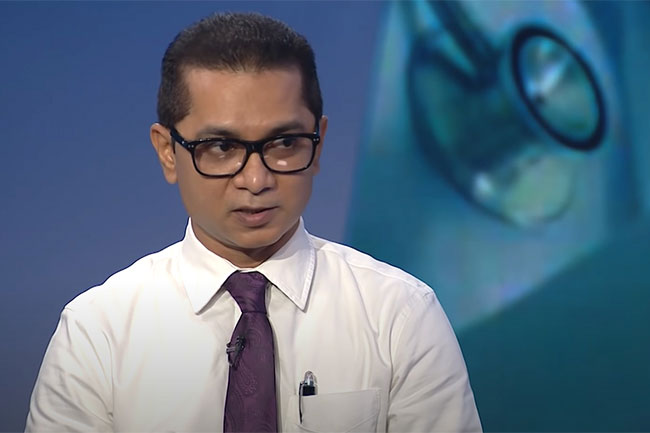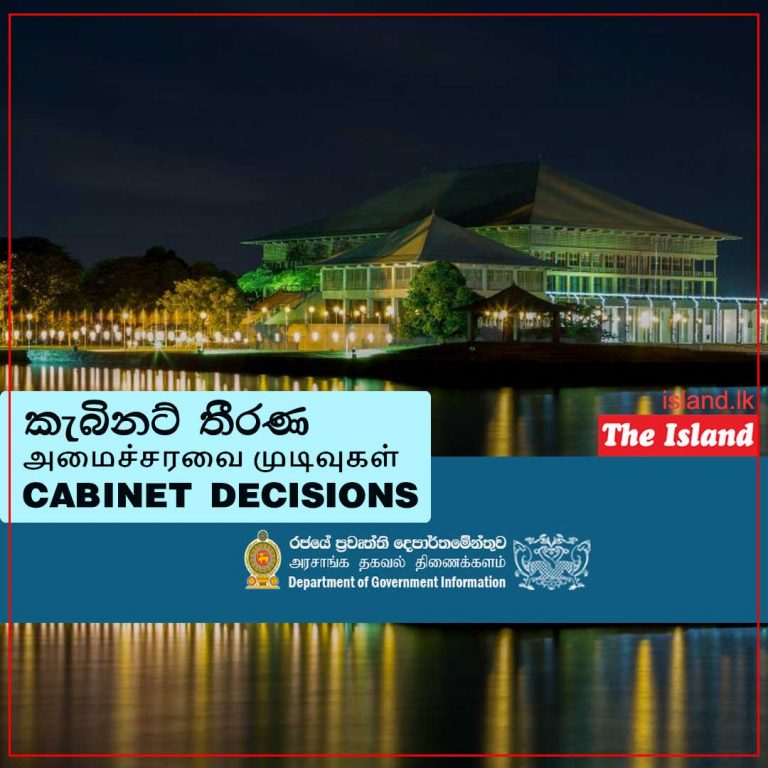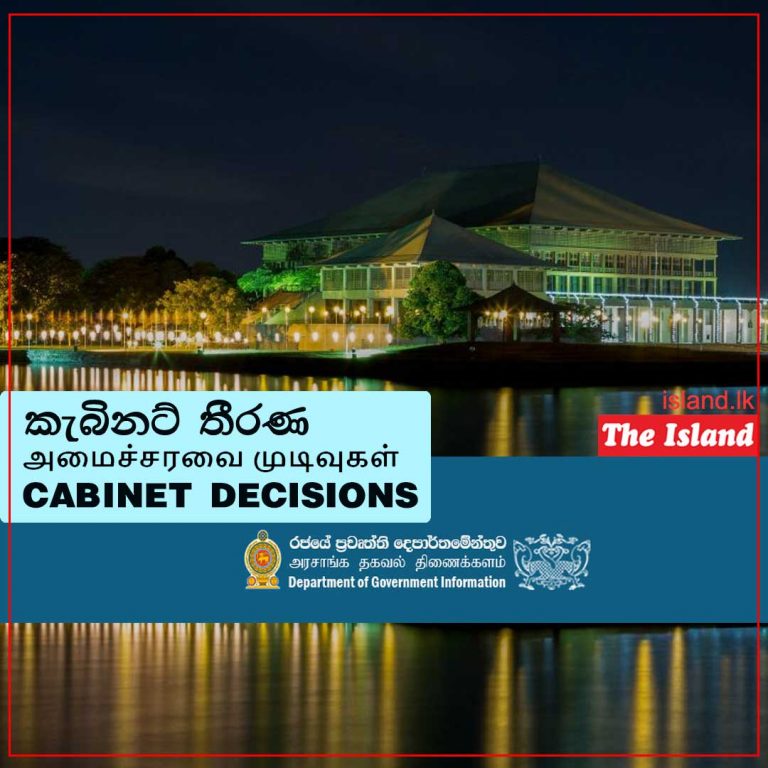News
Dr. Hamdani reports significant drop in new cases

By Rathindra Kuruwita
The lockdown has had a positive impact on COVID control, Medical Technical Services Director Dr. Anwar Hamdani said yesterday. He said that a few weeks back close to 5,000 new cases had been reported daily, but now the number had dropped to below 3,000.
“You can imagine the impact 5,000 new cases a day was having on the health sector capacity. Now, we have to think of keeping this trend going. It’s easy to hit the target, but we need the cooperation of all to maintain the gains we have made,” he said.
Dr. Hamdani said in Sri Lanka, both public and private sector, had 39,322 beds to treat COVID-19 patients in 264 centres. 70% of these beds were now full, but not too long ago 97% of those beds were occupied, he said.
“A few weeks ago, there were 1,040 patients who needed oxygen, now that number has dropped to 802. However, we must not think that the trend will continue if we stop all the measures we are taking now. If people start taking precautions, we can maintain this,” he said.
Dr. Hamdani said that although the number of tests conducted had dropped, those who were suspected to have COVID-19 and those in high-risk areas were being tested. Even in developed nations testing had been reduced, he said.
“We have to make use of the resources available in the optimal manner. We have a successful vaccination drive going, we must identify people and we have to treat them. Before vaccines arrived, we could deploy more people for testing but now things have changed. We are making all these decisions based on science,” he said.
Commenting on the number of deaths due to COVID, Dr. Hamdani said that the positive effect of the lockdown was still not reflected in the death tally. Usually, a person who dies from COVID-19 passes away after a few weeks in hospital, he said.
“In a few weeks the number of deaths will drop and with vaccinations increasing, the number of deaths will further decrease as time goes by,” he said.
Business
Cabinet approves submission of the Annual Economic Analysis of the Central Bank of Sri Lanka for the year 2024 to the Parliament

The Cabinet of Ministers has approved the proposal forwarded by the President in his office as the Minister of Finance, Planning and Economic Development to submit the Report on the Annual Economic Analysis of the Central Bank of Sri Lanka for the year 2024 to the Parliament.
As per section 80 (3) of the Central Bank of Sri Lanka Act No. 16 of 2023, the Minister in – charge of the subject of Finance shall submit a report on the economic situation which prevailed within the particular financial year, within four months after completion of each financial year. Accordingly, the report in relation to the financial review of the Central Bank of Sri Lanka for the year 2024 has been submitted to the President. The report has envisaged macro economic trends of Sri Lanka, situation of the financial system, as well as the major developments and a review of the policies of Central Bank of Sri Lanka.
[DGI]
Latest News
Cabinet approves signing of a tripartite memorandum of understanding between the South Asian Center for Teacher Development, UNESCO South Asian Regional Office, and Indira Gandhi National Open University

The Cabinet of Ministers has approved the proposal presented by the Prime Minister in her capacity as Minister of Education, Higher Education, and Vocational Education, to sign the tripartite memorandum of understanding between the South Asian Center for Teacher Development, UNESCO South Asian Regional Office, and Indira Gandhi National Open University.
The Asian Center for Teacher Development was established as an independent and self-financing institute. The UNESCO Executive Board has recommended promoting the functions of that institute and establishing partnerships with the other institutes and organizations of the region for updating the functions that should be performed by the said institute.
Accordingly, it had been proposed to sign a tripartite agreement between the South Asian Center for Teacher Development, UNESCO South Asian Regional Office, and Indira Gandhi National Open University with the objective of developing regional cooperation and strengthening the national and regional action plan, including the targets stipulated in the itinerary on 2030 sustainable development through the introduction of new training programs on quality media and information literacy. The clearance of the Attorney General has been received for the proposed draft memorandum of understanding.
News
Breakaway JVP faction decries Indo-Lanka MoUs as betrayal

… alleges Kanchana’s Electricity Act exploited to facilitate ‘deal’ with India
The Frontline Socialist Party (FSP) has alleged that President Anura Kumara Dissanayake entered into seven MoUs/Agreements with India without consulting Parliament or the Cabinet of Ministers.
Accusing President Anura Kumara Dissanayake, who is the leader of the Janatha Vimukthi Peramuna (JVP), as well as the National People’s Power (NPP), of undermining Sri Lanka’s sovereignty, the breakaway JVP faction pointed out the signing of seven MoUs/Agreements had coincided with the 54th anniversary of the JVP’s first insurrection.
The top FSP spokesman and their Education Secretary, Pubudu Jayagoda, told a press conference, at their Nugegoda party office, that the JVP had completely betrayed those who sacrificed their lives during the 1971 and 1987-1990 insurrections. Having completely changed its policy towards India, the JVP was now down on its knees before India, Jayagoda said.
The dissident JVPer emphasised that such vital MoUs/Agreements couldn’t be finalised without proper consultations. Declaring that the MoUs/Agreements hadn’t been released yet, Jayagoda said that the FSP, in terms of the Right to Information Act, sought the copies of them as the public couldn’t be deprived of their right to know.
The section, now calling themselves FSP, split from the JVP in early 2012 after major differences among the top leadership over the direction of the party. Anura Kumara Dissanayake succeeded Somawansa Amarasinghe as the JVP leader in Dec. 2014.
Referring to the MoU, in respect of the implementation of HVDC interconnection for import/export of power, Jayagoda said that the NPP took advantage of the new Electricity Act that was enforced by the Wickremesinghe-Rajapaksa government in late June last year to pave the way for a deal with India. The JVP-led NPP that moved court against the then Power Minister Kanchana Wijesekera’s Bill, and voted against the Bill at the second reading, exploited the same to its advantage, Jayagoda charged.
The Sri Lanka Electricity Bill repealed the 1969 Ceylon Electricity Board (CEB) Act and subsequent laws regarding the electricity industry.
Comparing the MoU, signed in the presence of President Dissanayake and Premier Narendra Modi, Jayagoda said that both Nepal and Bangladesh had been trapped in similar agreements they signed earlier.
Jayagoda alleged that Nepal was in such a pathetic situation even if they could meet electricity requirement through hydro-power generation, the agreement with India compelled them to obtain power from India.
Jayagoda pointed out that the government now boasted of a proposed new120 MW solar power plant at Sampur to be implemented in two stages after having crippled domestic solar power generation capacity. The former JVPer said that the NPP government was bending backwards to appease India and pursuing an agenda inimical to Sri Lanka.
Jayagoda dealt with the MoU on cooperation in the field of sharing successful digital solutions implemented at population scale for digital transformation. The FSP spokesman said that the Indian-funded project to issue digital NIC would be disastrous as it would enable India to gather information.
Commenting on a MoU that covered the health sector, Jayagoda alleged that the government had agreed to share authority exercised by the National Medicine Regulatory Authority (NMRA) with India.
Jayagoda said that the MoU on defence cooperation undermined the country’s vital security interests and jeopardised relations with other countries.
The FSP said that political parties, represented in Parliament, were largely silent and seemed to be reluctant at least to express their views on the betrayal of the country.
By Shamindra Ferdinando
-

 Business1 day ago
Business1 day agoColombo Coffee wins coveted management awards
-

 Features2 days ago
Features2 days agoStarlink in the Global South
-

 Business3 days ago
Business3 days agoDaraz Sri Lanka ushers in the New Year with 4.4 Avurudu Wasi Pro Max – Sri Lanka’s biggest online Avurudu sale
-

 Business4 days ago
Business4 days agoStrengthening SDG integration into provincial planning and development process
-

 Business3 days ago
Business3 days agoNew SL Sovereign Bonds win foreign investor confidence
-

 Sports5 days ago
Sports5 days agoTo play or not to play is Richmond’s decision
-

 Features2 days ago
Features2 days agoModi’s Sri Lanka Sojourn
-

 Sports4 days ago
Sports4 days agoNew Zealand under 85kg rugby team set for historic tour of Sri Lanka











